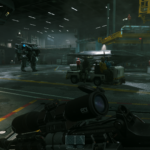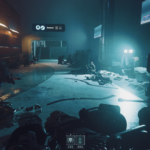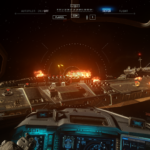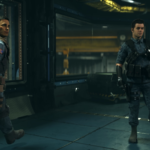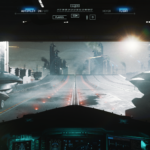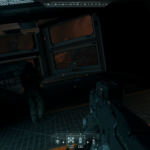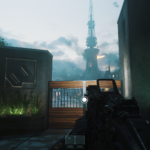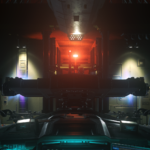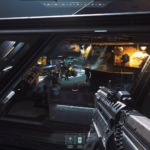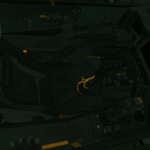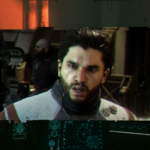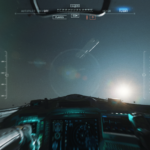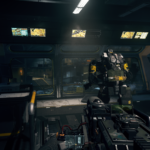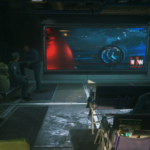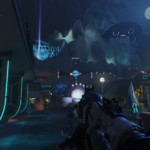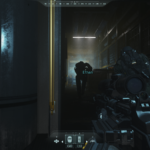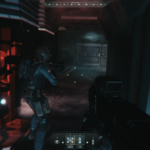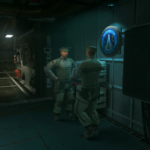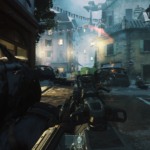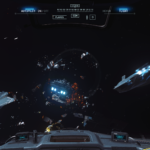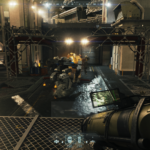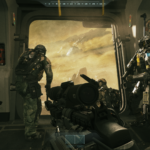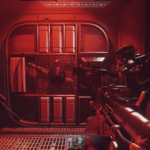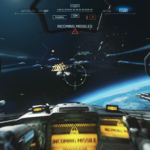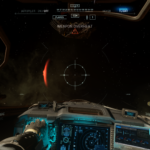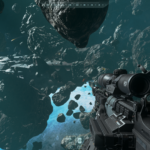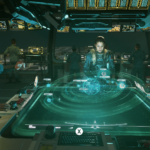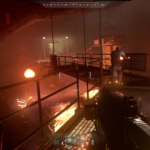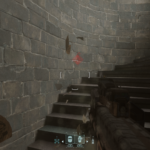 Call of Duty is a franchise that has tackled everything from World War II to the near future. Its formula for cinematic storytelling and competitive multiplayer has set it apart from the rest of the gaming industry and has made it adored by millions. Infinite Warfare now marks the thirteenth main game in the series and it finally takes the franchise into the distant future. Science fiction has always been in the hearts of gamers but with the genre making a resurgence in Hollywood, it’s the perfect time for Call of Duty to take a stab at it. The development studio at the helm of Infinite Warfare is no stranger to taking the next step. This studio founded the franchise in 2003 and redefined in in 2007. This studio if of course Infinity Ward and while their last outing with Ghost didn’t light the world on fire, it was generally regarded as solid. The biggest obstacle for Call of Duty is the one thing that has made it so good, its formula. The formula that has fueled game after game for years is starting to show its age. Can Infinite Warfare bring the youthful spark back to the franchise or will it merely move the franchise down the road for another year?
Call of Duty is a franchise that has tackled everything from World War II to the near future. Its formula for cinematic storytelling and competitive multiplayer has set it apart from the rest of the gaming industry and has made it adored by millions. Infinite Warfare now marks the thirteenth main game in the series and it finally takes the franchise into the distant future. Science fiction has always been in the hearts of gamers but with the genre making a resurgence in Hollywood, it’s the perfect time for Call of Duty to take a stab at it. The development studio at the helm of Infinite Warfare is no stranger to taking the next step. This studio founded the franchise in 2003 and redefined in in 2007. This studio if of course Infinity Ward and while their last outing with Ghost didn’t light the world on fire, it was generally regarded as solid. The biggest obstacle for Call of Duty is the one thing that has made it so good, its formula. The formula that has fueled game after game for years is starting to show its age. Can Infinite Warfare bring the youthful spark back to the franchise or will it merely move the franchise down the road for another year?
The story of Infinity Warfare takes place in the distant future. The solar system has been colonized. Earth’s resources are depleted and looks to the frontier of space to supplement its needs. To accomplish this goal, the governments of the world formed the United Nations Space Alliance (UNSA) as well as a military force called the Solar Associated Treaty Organization (SATO) to protect their interests. Prior to the events of the game, this atmosphere caused the emergence of the Settlement Defense Front (SDF) who successfully won the independence of Mars and despite this victory, the climate between the UNSA and SDF is at best described as tense.
Infinity Warfare has you playing the role of Nick Reyes, a lieutenant in the SATO military group. You’re currently stationed in Geneva for the Fleet Week celebrations. Unfortunately shortly after the beginning of the game, the defense cannons that were meant to protect Earth start firing on its own fleet. The ships that were able to escape into orbit were attacked by the SDF. It was a trap and by the time the invaders were repulsed, the once mighty armada of SATO was reduced to just two operational ships. SATO and SDF are now in open war. Your mission is to keep Earth afloat while delaying the SDF long enough to let it repair and rebuild, no small feat.
I really like the choice to take Call of Duty into the more distant future. What I don’t like is the disappointing story. If you remove the story, the bits and pieces paint a pretty picture. Some of the characters are really well done. The locations are cool. It takes a lot of inspiration from Battlestar Galactica. When the story builds momentum, it’s a fantastic cinematic experience. But when you add in the one-dimensional villain and ridiculously militaristic Settlement Defense Force, things just don’t add up. Luckily the context of why things are happening doesn’t have to interfere with what you are doing. In sum, you might have to turn your brain off at certain points but this is another enjoyable Call of Duty rollercoaster ride, it would’ve been nice if it had some more depth.
If you have ever played a Call of Duty title before, this one does not tread much new ground in terms of gameplay. It’s still a first-person shooter. Its movement system is the same as Black Ops 3. The single player is still designed to be a relatively linear cinematic experience. Multiplayer still offers the same core experience. Zombies is still all about killing undead. If you like what has come before, this has a lot more of the same. Infinity Warfare does do a couple things to mix this up to give this version its own distinct flavor though.
The single player campaign takes Call of Duty into some uncharted territory and this comes with some new challenges and gameplay opportunities. The two main ways this materializes is through a non-linear mission design for the mid-game. The game starts and ends with a highly focused linear experience but in the middle, you’ll have a choice in how you tackle or not tackle a variety of optional missions. The second main change is that combat can now take place in space, either on foot or in a vehicle. Therefore depending on the mission you might find yourself on the side of a ship fighting with no gravity or in a ship getting in dogfights and taking down large capitol ships.
These two feature definitely add something new to the Call of Duty formula but they never eclipse the traditional gameplay. The choice-based mission design is flawed in a couple ways. First and foremost, it takes away from the pacing of the story. This franchise is best when the story develops a cinematic flow that drives the gameplay and engrosses you in the experience. This side missions tend to not be as good as the main missions and they never really get the chance to develop the momentum needed to have a solid payoff. Plus the rewards for doing them are merely just new weapons for your arsenal and doesn’t have a noticeable impact on the story. The idea is solid. Giving the player choice is always a good idea. The execution just isn’t as good as it ought to be. The other new gameplay feature is the space combat. It just doesn’t feel good. The on-foot zero-g segments tend to just be a mess once you get into combat. It typically ends up with you just floating randomly as you engage with enemies. The best part is a grappling hook that allows you to pull yourself towards enemies and melee them. But navigating these experiences just doesn’t work intuitively and the gameplay they offer is not particularly compelling. The ship combat is a lot more cohesive thankfully, it just ends up a bit bland. Call of Duty has experimented with various types of ship combat in the past and has done relatively well. With this iteration, it takes these small segments in prior games and expands it to a good chunk of play time. The controls are well done and flying is nearly effortless. The dogfighting and attacking the larger ships is just not that interesting after a while. There is not enough variety to keep it interesting. To sum it up, the new additions are born in good places and the change of pace is definitely nice, they just need to be fleshed out better or rethought how to do better. Thankfully, the core Call of Duty experience still dominates the majority of the game and it’s just as good as ever. The pacing and momentum of the ending is amazing.
The next component of a Call of Duty is the multiplayer and Infinite Warfare offers some interesting tweaks on the formula. In addition to the traditional game modes and supply drops, there are two new additions of note. The first is Mission Teams. This will be an ever present voice between matches, giving you basic objectives to achieve that will yield more loot and upgraded weapons. The next is Combat Rigs and this one has a bigger impact on gameplay. Combat Rigs are basically an implementation of classes or categories of playstyle to Call of Duty. After choosing your combat rig, you get to choose your payload and traits. The payload is your special ability that can come in the form of a powerful weapon or gameplay modifier. The traits are very similar to perks but are exclusive to that rig.
The new features definitely build on or around the existing foundation that makes Call of Duty multiplayer great but the feeling at the end of the day is that the multiplayer could be better. First and foremost, the patches and in-game updates are getting ridiculous. This isn’t new with Infinite Warfare but it feel worse this time around and it’s getting frustrating. Second, the game implements the Black Ops 3 movement system but then through tweaks and level design has made it impotent. It would’ve been nice to either remove it or make some grand changes to fit the tone they’ve set for the multiplayer. After this, there are some minor quibbles. Mission teams are just another leveling system when the game already has several. Combat Rigs takes the Black Ops 3’s Specialists in a poor direction. Maps could be more interesting and offer more interesting gameplay.
What the prior paragraph boils down to, except for the first point, is that Infinite Warfare struggles with an identity crisis. On a lot of these points it’s trying to hold onto what the prior game did well while trying to do what it wants when the answer is really to shed Black Ops 3 and go all in on Infinite Warfare. While what we got is easily critiqued, it’s still Call of Duty. The multiplayer is still engaging and fun. Most will still pour countless hours into it. It’s just hard to shake the feeling that we got a slightly tweaked Black Ops 3 expansion pack and that’s a shame. It feels like Infinite Warfare wanted to make the experience more grounded and slower, which would’ve been an interesting take on the franchise after the past several years.
The next core component of Call of Duty these days is Zombies. Zombies in Infinite Warfare doesn’t particularly do anything new but what it does do is hone the experience for casual players. Prior iterations heavily relied on teamwork and the right weapon to succeed. The implementation this time around feels much more forgiving. This is no more evident than with the new death system. Before, when you finally bled out, you were out of the action for the round. Now, you go to the Afterlife Arcade and play games to earn the right to reenter the park. The next feature that should help is the addition of fate and fortune cards. These cards, earned from playing the game mode and selected prior to the match, give additional perks when activated during the game.
Purists may claim that Zombies is getting further and further from the original idea of the mode, the changes feel for the best. It is now a lot more enjoyable to play alone with random players via matchmaking. The more forgiving nature makes communication and coordination not as paramount. The death mechanic make it so you never truly leave the game, you’re already playing. The games in the Afterlife Arcade could be better though and it’ll be interesting to see if other maps will have their own take on the mechanic. The characters this time around are quite forgettable but fit nicely into the tone of the map. The one downside of the changes is that players will now live longer which means matches will be generally longer than before. Overall, this is a great mix-up of the traditional Zombies formula and it’s nice to finally get this level of accessibility for all players.
Call of Duty isn’t exactly the hottest commodity when it comes to graphical prowess but it’s showing here is good. When the game is brought in close for traditional levels, it looks great. The game processes shadows, reflections, and other atmospheric effects quite well. Characters and their animations look good. The general art direction elevates everything another notch. If you’ve ever seen the television show Battlestar Galactica, the game feels to have taken some inspiration from that and it works to great effect. It’s when the game is showing epic wide open areas or space battles that you can start to see graphics struggle. The textures on ships look flat and objects in the distance are not that detailed. In some of these areas as well as various cutscenes you can notice the introduction of more and more pre-rendered scenes. Graphically, Infinite Warfare executes in the spots it needs to and embellishes when it can. The rock steady framerate is great but the engine is showing some limitations.
A part of the Call of Duty formula is the sound design. It saturates the audio with tons of detailed sounds to create a believable atmosphere in which the narrative or gameplay sits. Infinite Warfare is no different in this regard and taking it into the distant future has allowed the team to create a lot of new sounds. Ship to ship combat, faster-than-light-travel, and some futuristic weapons all sound nice. The voice acting is fantastic, especially the chatter during combat. There is rarely a quiet moment in the gameplay and it always enhances the experience. The soundtrack does a decent job of pulling you into the game and showing you a good time but don’t expect it to be able to stand on its own. It fits into the current culture of soundtracks that are meant to sit in the background, enhance the narrative, but not be noticed. Overall it does everything you expect from a Call of Duty and that’s a great thing.
When a franchise makes it as far as Call of Duty, it’s hard to take the next step. One group of fans wants more of the same and another group wants something completely new. It’s easy to see the difficulty in appealing to the spectrum of gamers that want more Call of Duty. Infinity Ward should be commended for trying some new things with Infinite Warfare. Taking the story to the distant future and evoking the same feelings that we had for Battlestar Galactica was a great idea. Adding new elements to the gameplay like offering optional missions and taking the fight into space were once again, good ideas. The problem is with the execution. The multiplayer attempts to enhance the experience by providing more depth with the Combat Rigs and offering more choice with Mission teams. Once again, the execution is what makes these ideas suffer. Zombies also has some good ideas like the new death mechanic but once again, its execution could be a lot better. Luckily the core Call of Duty experience still dominates and is the glue that holds this package together. The majority of the single player is still traditional Call of Duty. The multiplayer at its heart is still classic Call of Duty. Zombies is still Zombies. The formula forged game after game is still strong and is the driving force for the overall experience. If you’re looking for a fresh take on Call of Duty, this offers little new to sate your thirst. If you’re looking for more of the same, Infinite Warfare has it in spades.
Gameplay
Graphics
Sound
Overall

